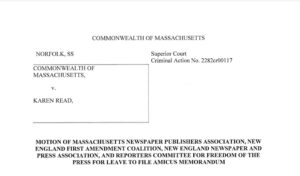
NENPA along with press groups successfully argued that both federal and state constitutional law prevent a Massachusetts court from forcing a reporter to disclose her notes from an interview with Karen Read, the defendant in a high-profile murder trial that has attracted national attention.
Prosecutors in the case were seeking notes that Gretchen Voss, a reporter for Boston Magazine, took during an interview with Read. The contents of these notes have not been published and likely contain Voss’s internal impressions, reactions and thoughts as the interview unfolded.
In his decision, Judge Cannone ruled:
“Voss has articulated a compelling argument that requiring disclosure of the notes poses a greater risk to the free flow of information than the other materials produced. Conversely, the Commonwealth has not demonstrated to the Court that its need for the handwritten notes, separate from the audio recordings, outweighs the danger posed to the public interest in the free flow of information.”
NEFAC, the Massachusetts Newspapers Publishers Association, NENPA and the Reporters Committee for Freedom of the Press filed an amicus memorandum on Jan. 30 explaining that:
“Under these circumstances, the government’s intrusion into entirely confidential communications between a reporter and source, including the thought processes and work product of a journalist, unjustifiably intrudes on First Amendment interests and, as precedent, would unnecessarily chill the newsgathering process.”
Read the amicus memorandum filed on Jan. 30.
Many states have reporter shield laws that explicitly protect journalists from forced disclosure of their notes and sources. While Massachusetts does not have such statutory protections, its state constitution along with the First Amendment often prevents confidential information from being disclosed.
